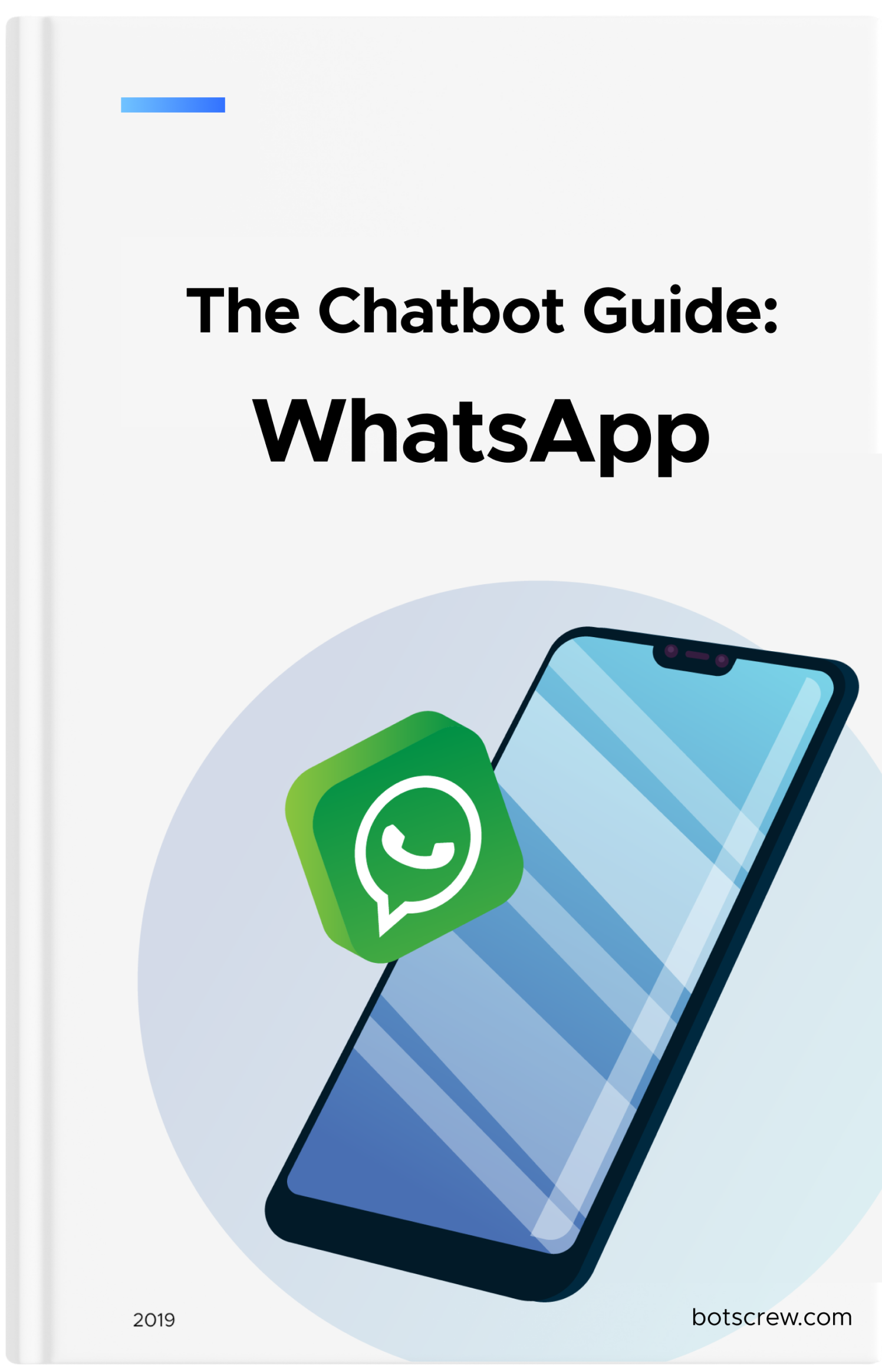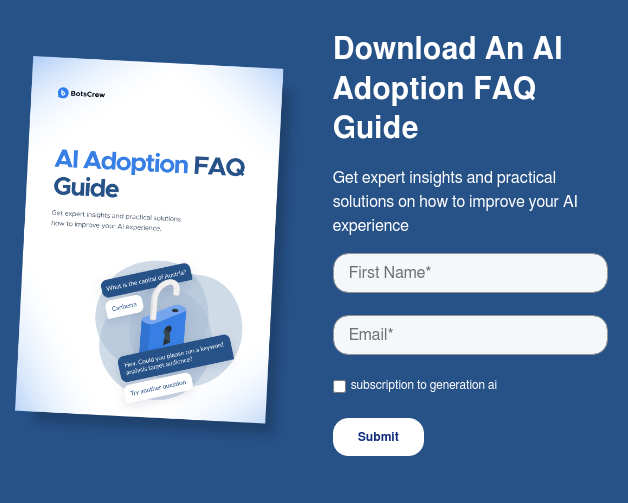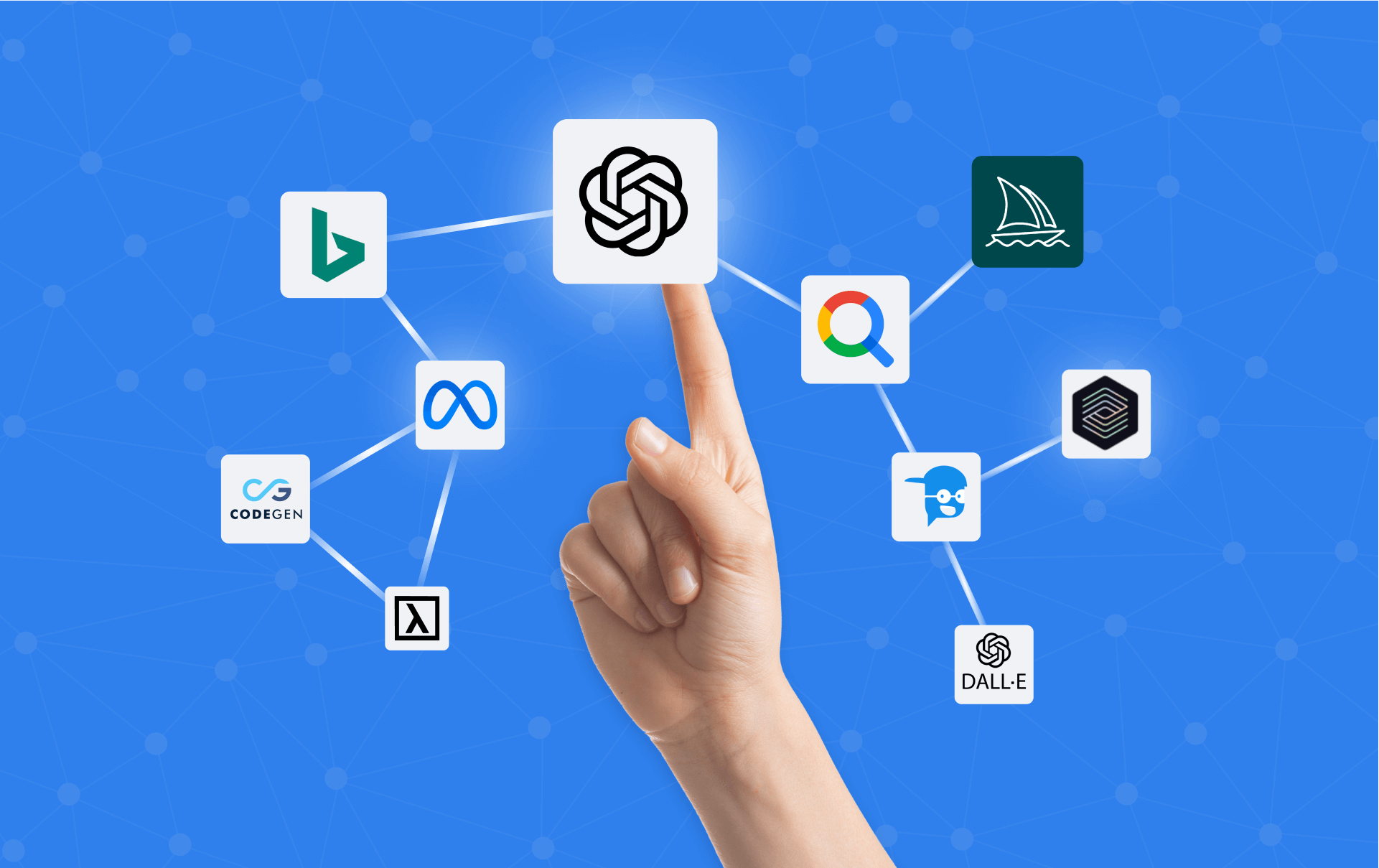Chatbot for the Automotive Industry: How Are Major Companies Using Generative AI
Generative AI and chatbots in the driver's seat: from R&D to on-road implementation — use cases, solutions, and implementation of a chatbot for the automotive industry.
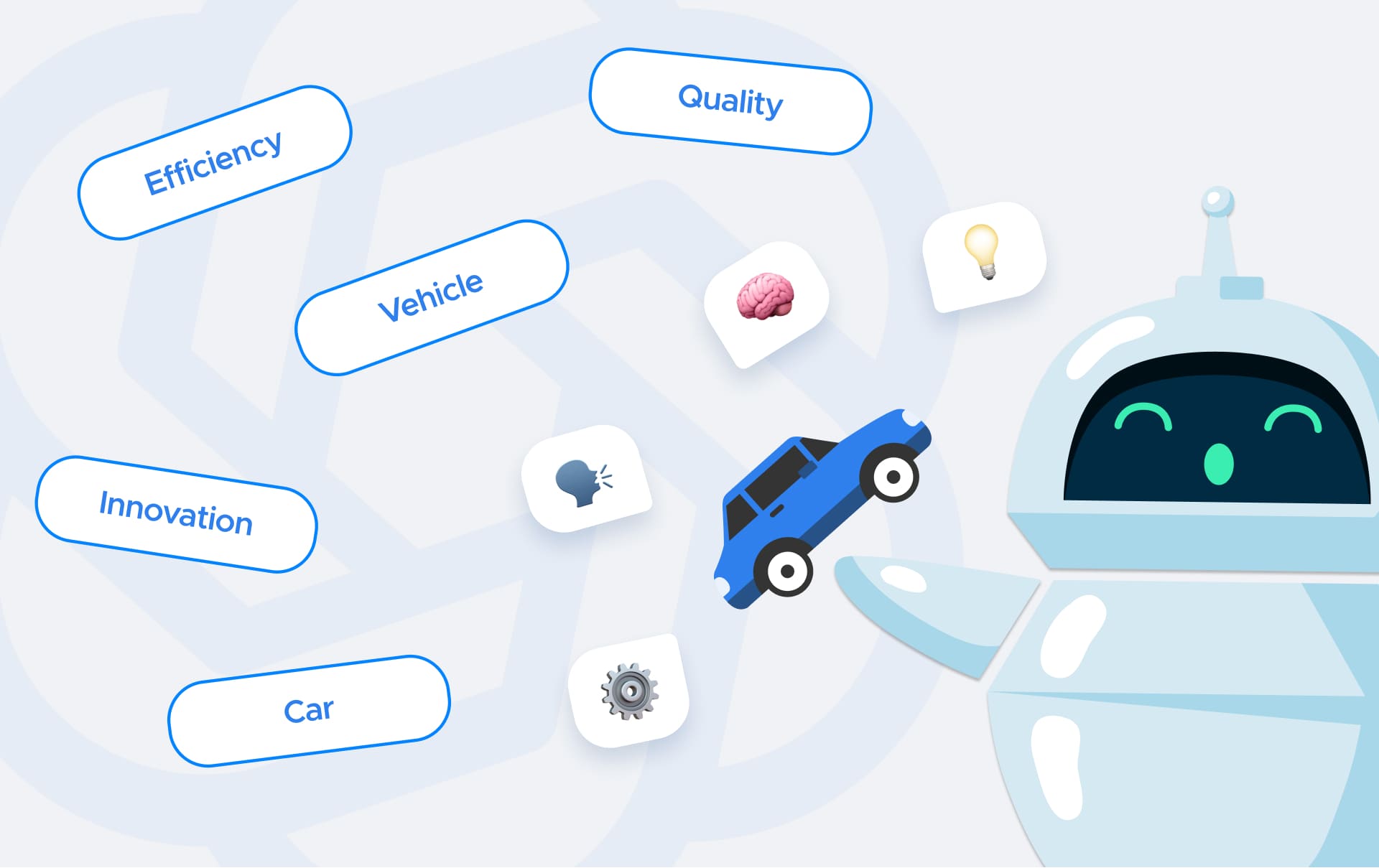
With generative AI and a sophisticated automotive chatbot, cars become more than sets of wheels. This technological leap lets vehicle owners stay ahead of the game, adding practical value and making the futuristic fantasy a reality, just around the corner. As for companies, AI technologies drive efficiency, innovation, and competitive advantage in the automotive sector.
In 2023, the market of generative AI in automotive was valued at a noteworthy $387.54 million, and it's on track to skyrocket to an impressive $2,691.92 million by 2032. This growth trajectory showcases a remarkable Compound Annual Growth Rate (CAGR) of 24.03% from 2023 to 2032, underscoring the sector’s dynamic evolution and the increasing integration of AI technologies in automotive advancements.
AI-powered chatbots for the automotive industry are also transforming this field. Over 90% of US vehicle dealers now offer chat services. Through the lens of industry leaders like BMW, Toyota, and Mercedes-Benz, we uncover how these technologies are used for competitive advantage.
Keep reading our blog post and gain insights on:
✅ Strategic Implementation: discover how are automotive companies using generative AI to innovate and stay ahead of the competition.
✅ Gen AI Mechanics: dive into the technologies powering Generative AI applications and understand the mechanics behind them.
✅ Expert Perspective: gain valuable insights on implementing generative AI for automotive from seasoned professionals.
✅ Future Directions: explore emerging trends and potential future applications of Generative AI in the automotive sector.
The Rise of Generative AI & A Chatbot for the Automotive Industry
According to a study by IDC and Microsoft, 71% of organizations are already riding the AI wave, with many more lining up to join. And the financial results are nothing short of spectacular: for every dollar invested in AI, businesses are raking in an average return of $3.50 (350%). This highlights the technology’s incredible ROI potential and proves that AI is a real game-changer.
A survey by Capgemini shows that Gen AI is a hot topic in boardrooms, with 94% of executives discussing it during meetings. Over half of them, 51%, are strong advocates for its use, and a significant majority, 66%, believe that the benefits of artificial intelligence far outweigh the risks.
AI chatbots are also making significant strides in transforming the automotive industry. They efficiently handle a wide range of customer inquiries, with 31% related to new cars, 20% to used vehicles, and 28% to service bookings. Impressively, about 90% of these questions are resolved directly by the bots. For more complex issues, the chatbots gather pertinent information for dealer follow-ups, ensuring a smooth and efficient customer service experience.
This digital shift isn't just about convenience — it is also a savvy move for cost efficiency. Take Renault's automotive chatbot promoting electric cars which slashed micro-conversion costs by 36%, showcasing the remarkable efficiency of a virtual assistance-based strategy.
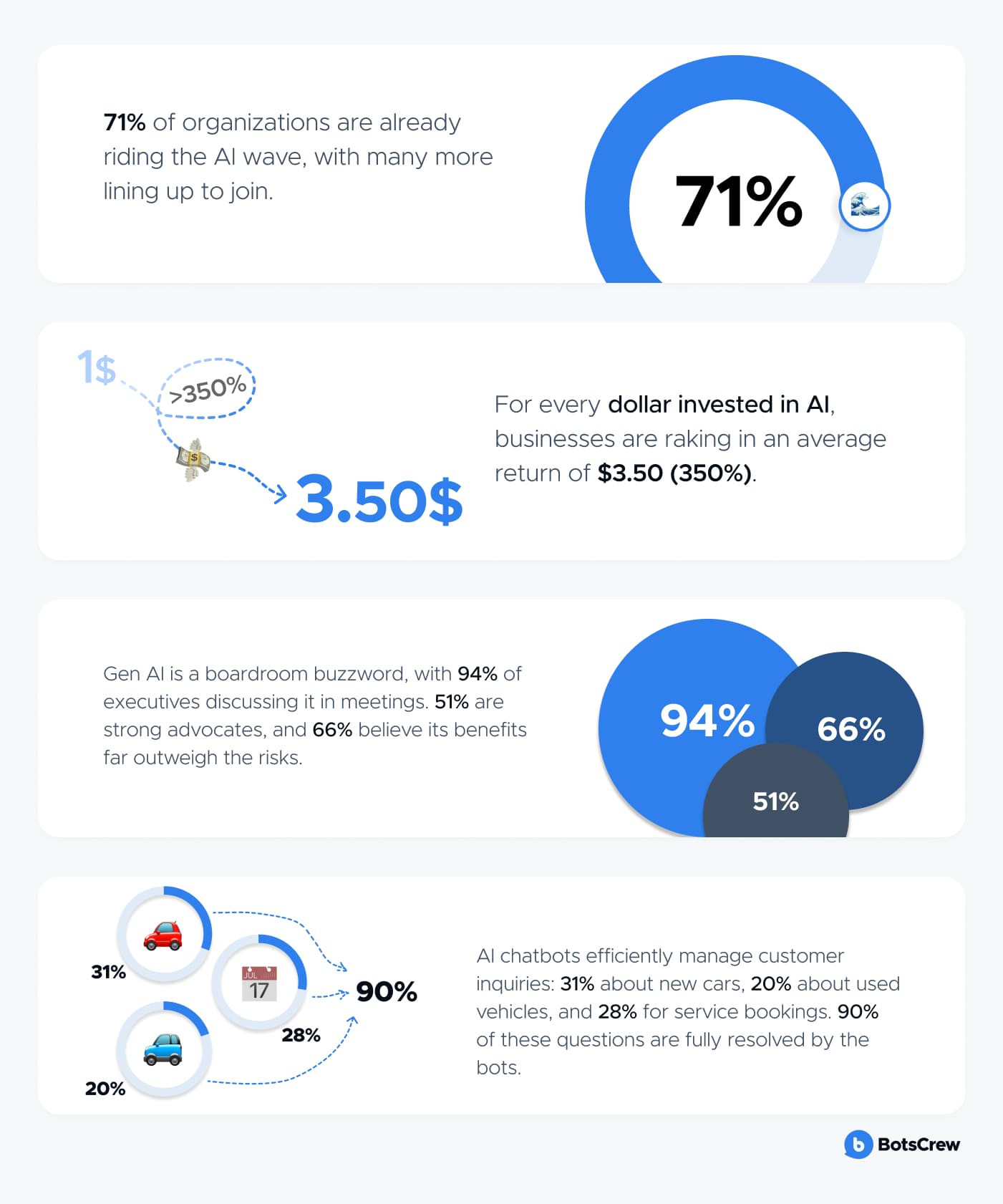
Ready to shift into the future? Harness the game-changing power of AI with our customized development services. Drive new industry standards with our cutting-edge expertise.
What Does Gen AI & Chatbots Offer Your Business?
Automotive businesses that integrate generative and conversational AI into their processes reap numerous benefits that extend beyond immediate operational improvements. We've put together the most significant ones.
✅ Capturing new leads and nurturing existing ones. Imagine a customer browsing your website, finding some info, and bouncing off. Now, picture another customer chatting with a chatbot, sharing their needs, and leaving their number. Which captures leads better? Automotive chatbots are game-changers in the industry. You can effortlessly capture and nurture leads, keeping your business ahead of the curve, with them.
✅ Scheduling test drives. Taking customer details for test drives can be a tedious task for employees. AI chatbots can handle this seamlessly, collecting data and scheduling test drives without any human intervention. With conversational AI, scheduling a test drive becomes a breeze for both employees and customers, eliminating waiting times and effort. To ensure security and protect sensitive customer information, businesses can partner with identity verification vendors. By integrating identity verification solutions, the AI chatbot can authenticate users in real-time, adding an extra layer of security to the scheduling process.
✅ Sending service reminders and managing appointments. Instead of using human resources to remind customers about service dates and appointments, you can let conversational AI take the wheel. Voice bots and chatbots can handle the repetitive task of scheduling and managing service appointments, freeing up your team for more complex duties. This ensures your customers stay on top of their vehicle maintenance without any hassle.
✅ Gathering customer feedback and data. Chatbots in the automotive industry can effortlessly collect feedback and data at every stage of the buyer's journey. This helps businesses pinpoint and smooth out any bumps in the road, leading to a more satisfying customer experience and providing customers with personalized offers.
Emerging manufacturers such as Rivian and Tesla are harnessing chatbots to collect conversational data, extracting insights into customer behaviour to enhance vehicle offerings. Volkswagen also employs a chatbot to streamline the search for pre-owned cars, making the process quicker and more efficient based on customer preferences.
✅ Speeding up product development and boosting deals. AI accelerates the entire product development cycle, from initial design to market launch, while refining marketing and sales strategies for more precise client targeting. This increased speed and precision benefit all stakeholders, including auto manufacturers, parts suppliers, and dealerships alike.
Last but not least, according to Automotive Management's study, chatbots put the pedal to the metal, cutting the average sales cycle by up to 30%, driving up customer satisfaction, and boosting conversion rates.
For consumers, it means:
- 24/7 Customer Support. Nowadays, people buy experiences, not just products. No one wants to wait 15 minutes for a short answer from a salesperson or customer service rep. With conversational AI, customers can get instant replies on car purchases, features, or maintenance — day or night, even after business hours.
- Purchase Assistance. When customers decide to buy a vehicle from your brand, they have a lot of questions. What is the on-road price? What are the EMI options? When can the vehicle be delivered? What colors and models are available? AI chatbots can answer these questions instantly, streamlining the purchase process, as well as making it smooth and hassle-free.
- Customized Settings. AI technology meticulously adjusts in-vehicle parameters such as seating and climate control, catering to each driver's preferences. Furthermore, Porsche and Toyota are now revving up with online configurators, allowing buyers to fine-tune their dream rides to perfection before making a purchase.
- After-Sales Services. Customer experience doesn't hit the brakes once the vehicle is sold. After-sales service is a crucial part of the overall experience. AI chatbots excel at handling routine customer queries in natural language, making the post-purchase process efficient.
- Proactive Vehicle Maintenance. The technology predicts maintenance requirements, issuing timely reminders for servicing and repairs.
Generative AI & Chatbot Use Cases in the Automotive Industry
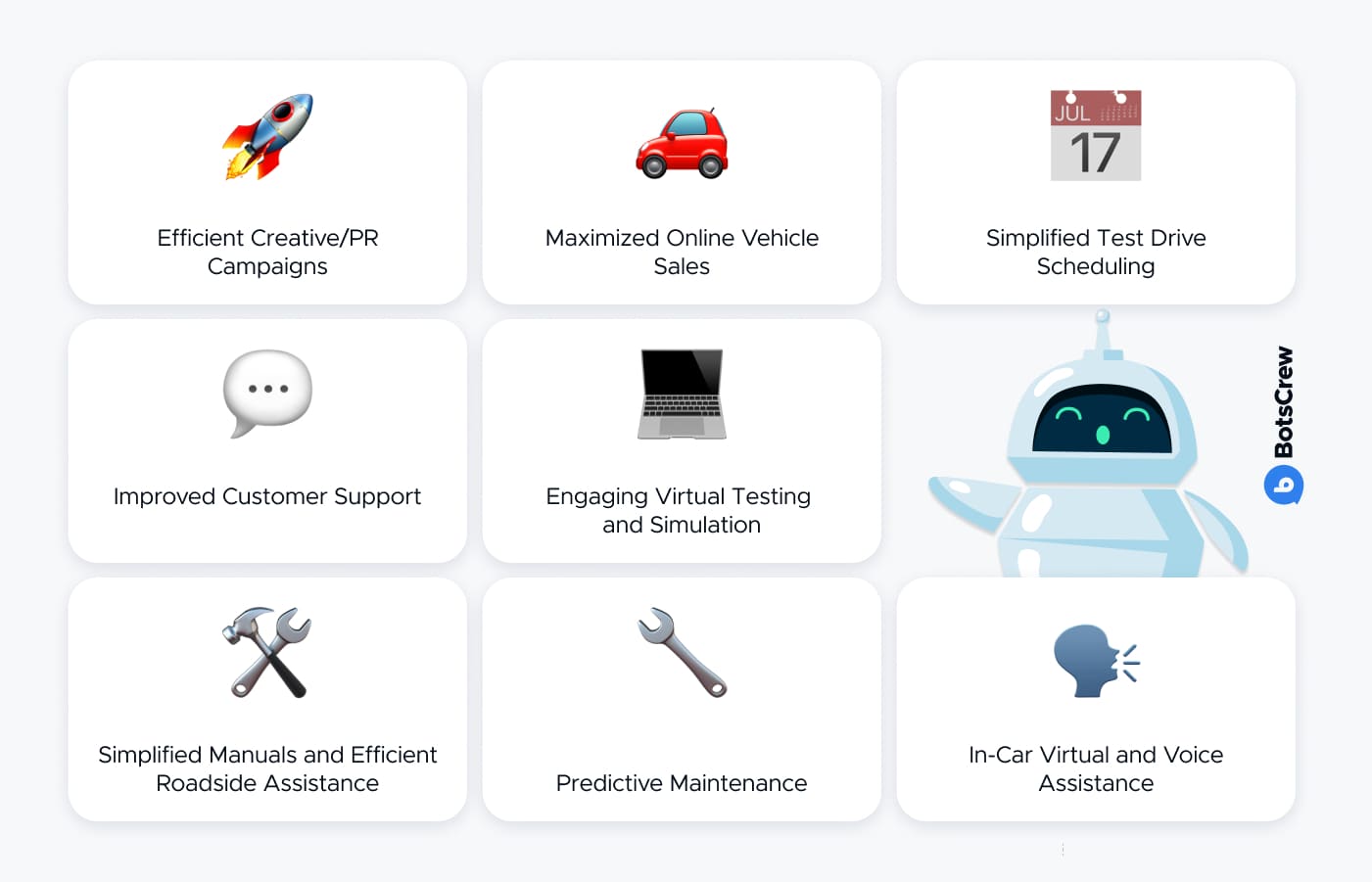
Efficient Creative/PR Campaigns
Conversational AI can be a game-changer for creative companies looking to boost car sales. Whether promoting a newly launched vehicle or increasing the sales of an older model that's lost its buzz, chatbots offer innovative solutions.
For instance, you can publish a special code or keyword on specific pages of your website. Users can then enter this code into a chatbot for the automotive industry to unlock a secret video demonstration of a new vehicle model. Furthermore, you can "bring the car to life" by creating a chatbot specifically for that model, giving it a unique personality and voice.
Want to sell more Mercedes G-Class cars? Make your automobile chatbot exude ruggedness. For the Volkswagen Touareg TDI or BMW 1-Series Hatchback, design a chatbot with a confident personality and communication style. Give the Land Cruiser an adventurous ToV, making the chatbot's persona flexible and always ready for a new adventure. After all, this is the vehicle for any spontaneous off-road journey.
Maximized Online Vehicle Sales
Companies can effectively sell cars through a top-notch automotive chatbot. Users can ask about a model's features, get detailed answers, and receive further assistance with their purchase. One of our clients, a major car manufacturer, launched an automobile chatbot and sold their first vehicle within the first two weeks after the solution went live.
Simplified Test Drive Scheduling
Car dealerships can rev up their test drive bookings with chatbots. For instance, we teamed up with a client to implement a white-label version of our GPT platform, a chatbot for sales, across their dealerships. The SMS chatbot, prominently featured as the main call-to-action on their website, is also integrated with Google For Business. Using a chatbot for the automotive industry led to a remarkable 20% conversion rate.
Additionally, Mercedes-Benz Cars Middle East launched a Facebook Messenger Bot allowing users to schedule test drives and explore the newest Mercedes-Benz models.
Improved Customer Support
BMW Group Company developed an intelligent bot designed to revolutionize consumer interaction and service processes. Its primary role is to efficiently handle a high volume of inquiries from car owners, even outside regular working hours.
The chatbot excels in tasks ranging from scheduling test drives to providing comprehensive leasing details. Improving response times and accessibility not only lightens the workload for human staff but also strengthens customer relationship management, proving to be a valuable asset in enhancing buyer satisfaction and service efficiency.
Engaging Virtual Testing and Simulation
Generative AI for automotive provides a playground where every inch of a car's performance can be analyzed. Engineers can simulate driving scenarios, from the hustle and bustle of city streets to the bumps of off-road trails, to see how a vehicle holds up. This deep dive into data uncovers potential hiccups and areas ripe for improvement.
AI also steps up to the plate in mimicking consumer experiences. It models how drivers and passengers engage with the vehicle, from the coziness of the seats to the user-friendliness of the infotainment system.
Simplified Manuals and Efficient Roadside Assistance
AI-enhanced car manuals have evolved from simple books to interactive assistants. They understand specific questions and offer precise, car-specific advice, making them a real game-changer.
Roadside support is also revving up with Generative AI software development. Virtual assistants can quickly diagnose vehicle issues by analyzing data or listening to the driver's description, leading to faster, more accurate help. It’s a huge win for auto enterprises, especially those managing vehicle fleets, saving on service call costs, and providing valuable data for better maintenance planning.
The perks of AI in manuals and roadside assistance go beyond immediate fixes. The data from these interactions is a goldmine for car companies, offering insights into vehicle performance and common driver issues. This information helps design better, user-friendly cars.
Predictive Maintenance
AI-driven predictive maintenance systems identify potential problems before they occur, analyzing sensor data and performance metrics in real time. They catch irregularities in vehicle components, predict maintenance needs, and plan timely repairs or replacements. For automakers, it means fewer warranty claims and happier customers, as their vehicles become more reliable and cheaper to maintain over time.
In-Car Virtual and Voice Assistance
Generative AI in automotive is transforming how we interact with our vehicles. They simplify tasks like navigation, music, and messaging with voice commands, keeping drivers focused on the road. For vehicle companies, these assistants enhance vehicle appeal and open new opportunities for in-car shopping and services, like ordering food or finding parking.
The voice-enabled chatbot is becoming essential. A study found that 50% of drivers are interested in adding Generative AI to their car assistants, with interest rising to 75% among frequent users. Even occasional users, 28%, are open to these features. These AI systems understand natural speech, providing traffic updates, route suggestions, and appointment reminders.
AI's influence spans the entire vehicle manufacturing lifecycle. By analyzing data from all stages of the manufacturing process, including detailed production monitoring, it spots areas for improvement, continuously refining processes. For the automotive sector, this means constantly evolving production methods, resulting in higher quality vehicles, more satisfied customers, and a stronger competitive edge, all without throwing a wrench in the works.
How World-Known Automotive Leaders Use Gen AI & Chatbots
Forerunners using generative AI in automotive are not just adopting cutting-edge technologies, they are pioneering a revolution. They harness Gen AI to redefine vehicle design, enhance production efficiency, and elevate customer experiences.
An AI Voice and Text Chatbot for a Major Car Manufacturer (NDA)
In 2021, a major Australian car brand launched an innovative ad campaign targeting millennials, aiming to make the car-buying experience less confusing and more engaging.
Teaming up with an advertising agency, they came up with a game-changing idea: a "living" vehicle that sells itself using chatbot technology. We jumped in, providing a detailed presentation to nail down the chatbot's vision, goals, budget, and architecture, complete with NLP for the car's specific queries. This approach aimed to create a human connection and make the buying process more enjoyable.
We designed the conversation flow, trained the chatbot for the automotive industry to understand and ask follow-up questions, and enabled it to generate audio responses. Additionally, we facilitated the exchange of voice messages between the backend and the car company's website frontend via API, allowing interactions through Facebook Messenger and Google Assistant.
The AI voice and text automotive chatbot became accessible through a landing page, Facebook Messenger, and Google Assistant. Users could inquire about the car's fuel economy, boot capacity, hybrid engine, favorite dad joke, dating advice, and more, covering 300 topics. In just three months, 15,000 users engaged with the chatbot, revolutionizing the car-buying experience for millennials.
In a world with voice-activated vacuum cleaners and talking toasters, why should cars miss out on the party, right?
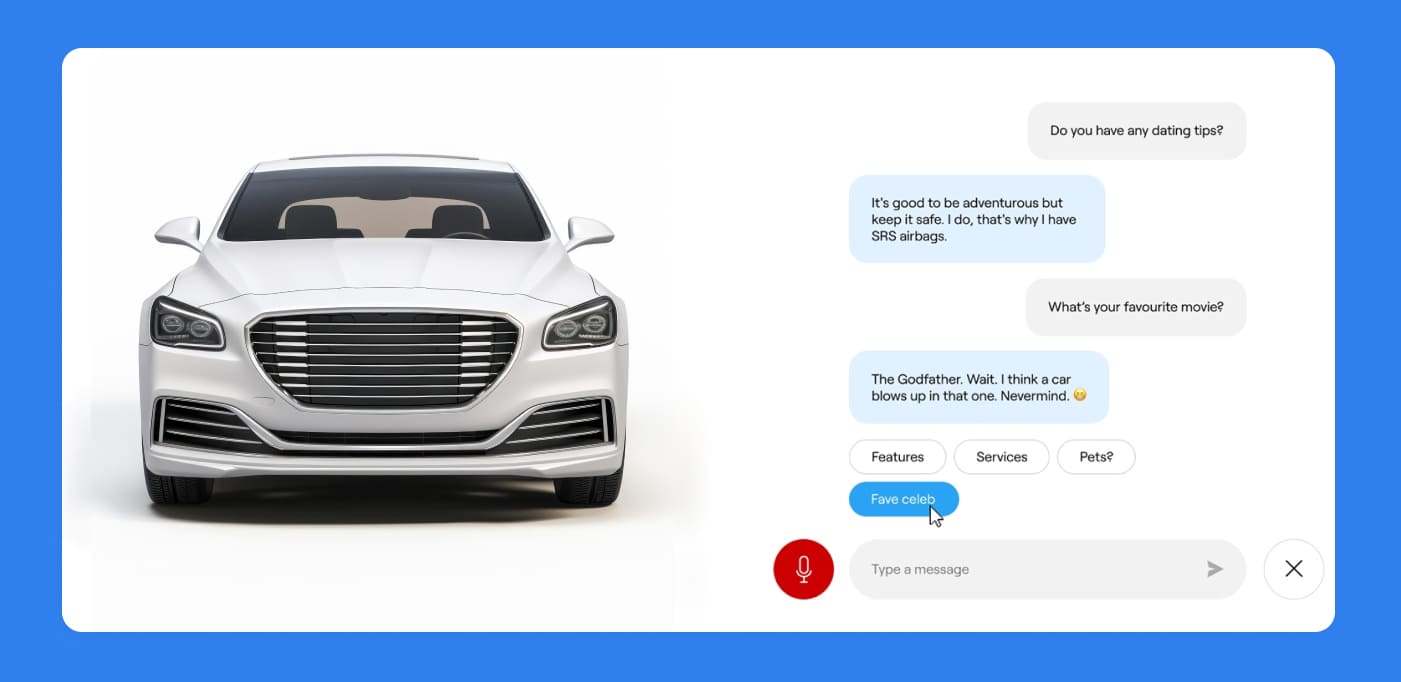
Mercedes-Benz
Mercedes-Benz has embraced GenAI with ChatGPT, enhancing their "Hey Mercedes" in-vehicle assistant and expanding its use across 900,000 vehicles in the US market, with plans for further integration.
Beyond customer applications, Mercedes-Benz leverages ChatGPT in production lines to consolidate quality data efficiently. It accelerates defect identification across development, manufacturing, and customer domains, simplifying complex evaluations and presenting insights in user-friendly formats. Additionally, the chatbot for the automotive industry facilitates access to manufacturing data through intuitive interactions, benefiting non-technical staff.
In the Middle East, Mercedes-Benz pioneered the use of the Facebook Messenger Bot for booking test drives and exploring new models, offering a bilingual experience in English and Arabic to enhance accessibility and customer insights.
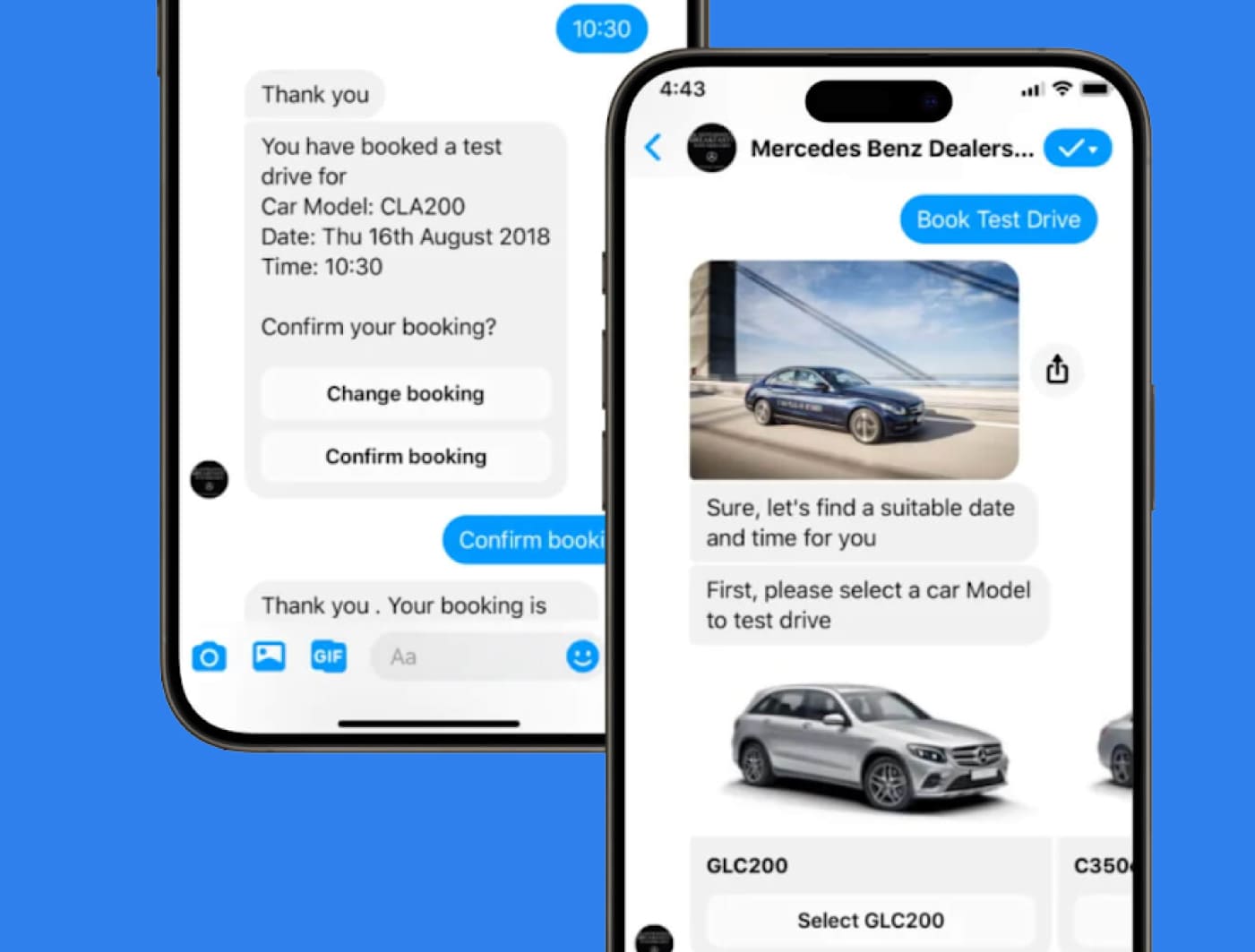
Toyota
Toyota's Research Institute is at the forefront of Generative AI, using a novel tool to turn text prompts like sleek and SUV-like into prototype sketches for new electric vehicles (EVs). This cuts down on design iterations by integrating key factors like aerodynamics and cabin size, ensuring both beauty and functionality.
Toyota’s also rocking the boat with its in-house custom chatbot powered by large language models (LLMs). This bot handles thousands of support tickets weekly, freeing up staff to tackle more complex issues. It's like having a virtual army of 25 service techs, saving over 70,000 hours a year for higher-value work.
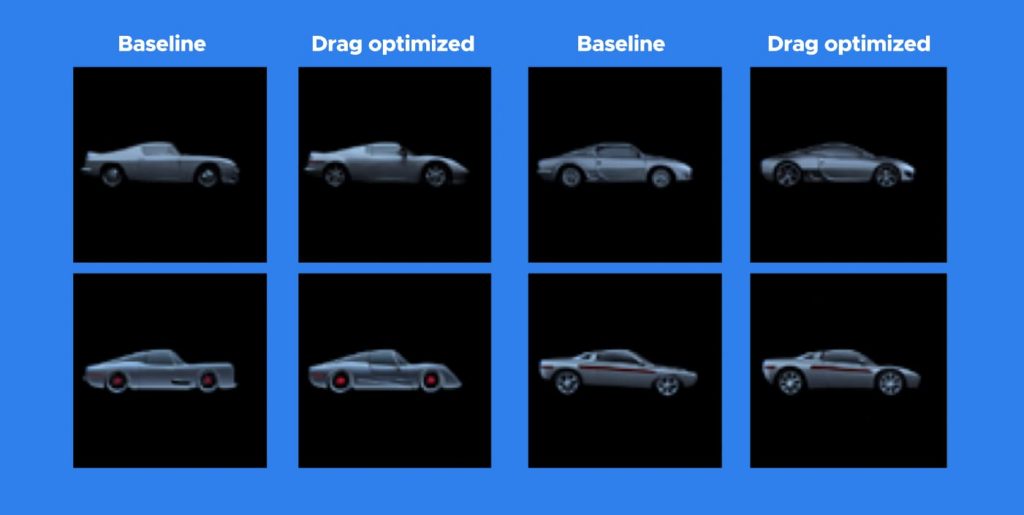
BMW
BMW is also on the cutting edge of AI innovation, using Generative AI for plant scheduling optimization. Partnering with a tech firm, they trained an algorithm on various solutions from traditional Machine Learning optimizers.
Their partner ran about one million optimization cycles, testing numerous configurations, algorithms, and optimizer categories to find the best solutions tailored to BMW’s needs. The GenAI-based tool showed a 71% performance improvement over other top techniques. This significantly boosted BMW’s scheduling efficiency, reduced idle time, and helped hit production targets with precision.
Ford
Ford's commitment to self-driving technology and Gen AI is backed by a hefty $1 billion investment, including in their subsidiary Latitude AI. This innovative technology is set to debut in future Ford vehicles, marking a significant leap forward in automotive automation.
Also, the company uses generative AI in automotive to automatize quality assurance, optimize supply chain logistics, and analyze data for their used car inventory.
Future Is Here: Trends in the Automotive Market That Are Reshaping The Industry Now
Let's dive into the latest trends shaping up in the automotive industry post-generative AI discussions. These not only showcase current breakthroughs but also hint at what's on the horizon:
Making a Green Impact. Generative AI drives the development of eco-friendly vehicles, cutting down on carbon footprints and environmental strain.
Tailored Infotainment Bliss. Gen AI personalizes in-car entertainment and navigation to fit each driver's fancy, using voice recognition to make commands and interactions uniquely yours. It learns from your preferences, suggesting content that hits the spot, and creating a more intuitive ride.
City Slickers. AI smooths out urban traffic snarls by predicting congestion and optimizing public transport schedules and routes. It's like having a traffic whisperer, making city travel less chaotic and more efficient.
Autonomous Evolution. Self-driving tech powered by AI learns and adapts on the fly, foreseeing road hazards and reacting proactively. These systems keep getting sharper, ensuring safer journeys with each mile.
Don't lag behind the curve — adopt Generative AI like BMW and Toyota. Partner with BotsCrew to automate, cut costs, and innovate faster.




